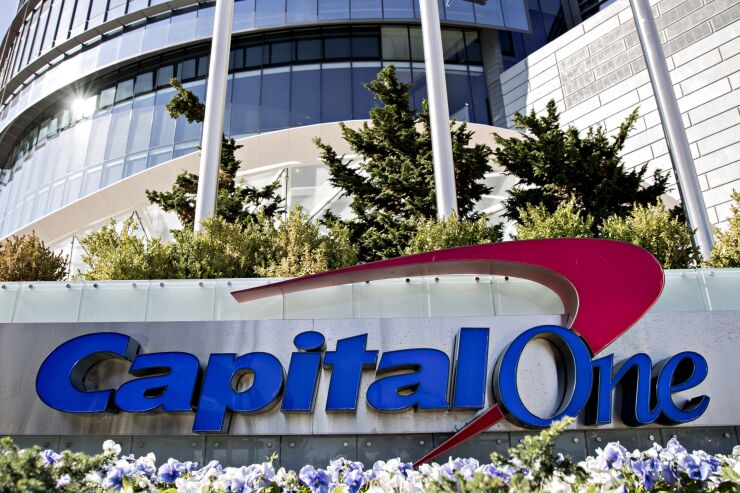Capital One Financial has been hit with a $290 million penalty after admitting to the U.S. Treasury Department that it willfully violated anti-money laundering requirements between 2008 and 2014.
The problems, which involved a unit that served cash-checking businesses and has since been shut down, were first revealed years ago. But documents released Friday by Treasury’s Financial Crimes Enforcement Network contained new details, including Capital One’s admission that it failed to file suspicious activity reports even when it knew about criminal charges against specific customers.
“The failures outlined in this enforcement action are egregious,” Fincen Director Kenneth Blanco said in a press release. “Capital One willfully disregarded its obligations under the law in a high-risk business unit.”

A Capital One spokesperson said in an email that the McLean, Va.-based company is pleased to resolve the matter, calling it the last remaining government inquiry into a now-defunct business, and saying that the firm was fully reserved to pay the nine-digit penalty.
“Capital One takes its anti-money laundering obligations very seriously,” the company spokesman said. “The bank has invested heavily in the enhancement of its AML program over the past several years under new AML leadership, and has worked closely with regulators and law enforcement to ensure our compliance processes and protocols are robust and thorough.”
Capital One acquired the check cashing group in its 2006 purchase of New York-based North Fork Bank. The unit’s customers included dozens of check cashers in the New York and New Jersey areas, according to a document that Fincen made public on Friday. Services that the unit included check processing and armored car cash shipments.
Capital One acknowledged errors involving currency transaction reports, which banks are required to file with the government when customers conduct cash transactions over $10,000. The $422 billion-asset admitted that it was negligent in failing to file the reports on roughly 50,000 transactions totaling more than $16 billion.
Capital One also admitted that it failed to file suspicious activity reports in connection with Domenick Pucillo, who owned numerous check-cashing businesses in the New York area. Pucillo was described Friday by Fincen as a convicted member of the Genovese organized crime family and the fourth-largest customer of Capital One’s business unit that served check cashers.
The bank learned in 2013 about potential criminal charges against Pucillo in New Jersey. Nonetheless, Capital One subsequently allowed Pucillo’s entities to conduct more than 20,000 transactions worth roughly $160 million through 23 deposit accounts, according to Fincen.
Capital One shut down the commercial banking unit that served check-cashing businesses in 2014. Five years later, Pucillo pleaded guilty to conspiring to launder money in connection with loan sharking and illegal gambling proceeds that flowed through his Capital One accounts, Fincen stated.
“Capital One’s egregious failures allowed known criminals to use and abuse our nation’s financial system unchecked, fostering criminal activity and allowing it to continue and flourish at the expense of victims and other citizens,” Blanco said. “These kinds of failures by financial institutions, regardless of their size and believed influence, will not be tolerated.”
Fincen said that Capital One took significant steps to cooperate with its investigation and to remediate the problems, which it took into account in determining the size of the fine assessed. The civil money penalty totaled $390 million, but Capital One was credited $100 million for a penalty that it paid to the Office of the Comptroller of the Currency in 2018.
The OCC





